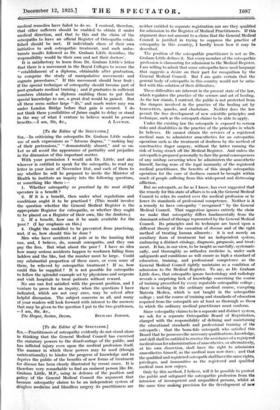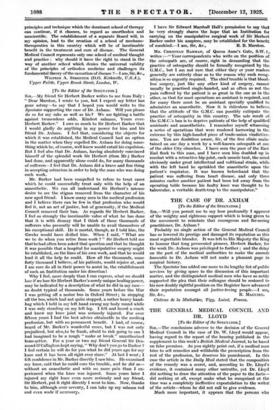[To the Editor of the SPECTATOR.] Sia,—Practitioners of osteopathy evidently
do not stand alone in thinking that the General Medical Council has exercised the statutory powers to the disadvantage of the public, and has inflicted injury even upon the medical profession itself. The manner in which these powers may be used (though unintentionally) to hinder the progress of knowledge and to deprive the public of the benefits of new forms of treatment for disease has been clearly illustrated by recent cases. It is therefore very remarkable to find an eminent person like Dr. Graham Little, M.P., using in deferice of the position and policy of the General Medical Council the argument that because osteopathy claims to be an independent system of diugless medicine and bloodleSs surgery its practitioners are
neither entitled to separate registration nor are they qualified for admission to the Register of Medical Practitioners. If this
argument does not amount to a claim that the General Medical Council is justified in trying to suppress the practice of osteopathy in this country, I hardly know how it may be described.
The position of the osteopathic practitioner is not as Dr. Graham Little defines it. Not every member of the osteopathic profession is clamouring for admission to the Medical Register. I am willing to admit that some osteopaths have used language that suggests a desire on their part for recognition by the General Medical Council. But I am quite certain that the gerieral body of osteopaths in this country would not be satis- fied with this solution of their difficulties.
These difficulties are inherent in the present state of the law, which regulates the practice of the science and art of healing. As the law stands, I contend, the public is not protected from the dangers involved in the practice of the healing art by bonesetters, quacks, and charlatans. Neither does the law permit the free development of new scientific principles and technique, such as the osteopath claims to be able to apply.
Under the existing law the osteopath is exposed to serious risks and disabilities in the practice of the principles in which he believes. Iie cannot obtain the services of a registered medical man to administer anaesthetics for an osteopathic operation such as the treatment of deafness by the method of constructive finger surgery, without the latter running the risk of being struck off the Medical Register. And unless the osteopath is prepared personally to face the penal consequences of any mishap occurring when he administers the anaesthetic himself, having none of the legal immunity of the registered medical practitioner, the benefits of this simple osteopathic operation for the cure of deafness cannot be brought within reach of people suffering from this widespread and distressing affliction.
But no osteopath, as far as I know, has ever suggested that the remedy for this state of affairs is to ask the General Medical Council to relax its control over the medical profession or to lower its standards of professional competence. Neither is it a remedy to have osteopathy " recognized " by the General Medical Council. That suggestion ignores entirely the claim we make that osteopathy differs fundamentally from the dominant school of therapy represented by the General Medical Council. Its principles and its technique are based upon a different theory of the causation of disease and of the right method of treating human ailments : it is not merely an auxiliary form of treatment but an independent system, embracing a distinct etiology, diagnosis, prognosis, and treat- ment. It has, in our view, to be taught as carefully, systemati- cally, and thoroughly as orthodox medicine is, under such safeguards and conditions as will ensure as high a standard of education, training, and professional competence as the General Medical Council rightly maintains as a condition of admission to the Medical Register. To say, as Dr. Graham Little does, that osteopaths ignore bacteriology and radiology reveals a surprising lack of knowledge concerning the course of training prescribed by every reputable osteopathic college ; there is nothing in the ordinary medical course, excepting Materia Medics, which is not taught in the osteopathic college ; and the course of training and standards of education required from the osteopath are at least as thorough as those to which the ordinary medical practitioner must conform.
Since osteopathy claims to be a separate and distinct system, we ask for a separate Osteopathic Board of Registration, charged with the responsibility of defining and maintaining the educational standards and professional training of the osteopath ; that the bona-fide osteopath who satisfied this Board that he possesses the necessary qualifications, knowledge, and skill shall be entitled to receive the assistance of a registered medical man for administration of anaesthetics, or alternatively, at his own discretion, shall have the right to administer anaesthetics himself, as the medical man now does ; and that the qualified and registered osteopath shall have the same rights, privileges, and immunities as the registered and qualified medical man now enjoys.
Only by this method, I believe, Will it be possible to protect the public and safeguard the osteopathic profession from the intrusion of incompetent and unqualified persons, whilst at the same time making provision for the development of new principles and technique which the dominant school of therapy can continue, if it chooses, to regard as unorthodox and unscientific. The establishment of a separate Board will, in my opinion, lead to the creation of a school of mechano- therapeutics in this country which will be of inestimable benefit in the treatment and cure, of disease. The General Medical Council represents only one school of medical thought and practice : why should it have the right to stand in the way of another school which denies the universal validity of the principles of orthodox medicine and challenges its fundamental theory of the causation of disease ?—I am, Sir, &c., WiLvam A. STEEF:rea (D.O. Kirksville, U.S.A.).
Upper Feilde, Upper Brook Street, London, W.























































 Previous page
Previous page